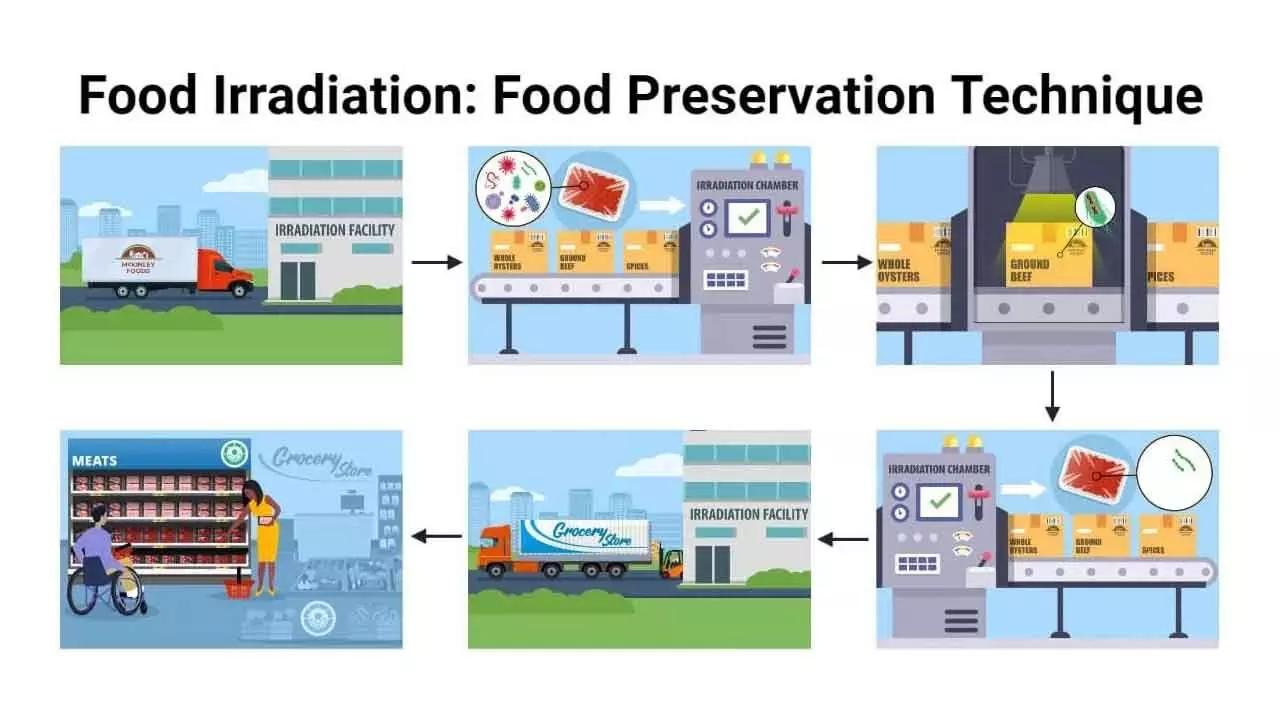Preserving The Shelf Life Of Food Without Compromising On Quality Is The New World Order
The acceptance levels of food irradiation have been rising consistently among all novel preservation techniques
Preserving The Shelf Life Of Food Without Compromising On Quality Is The New World Order

The ‘Minimum waste, maximum value’ initiative focuses on the critical need for waste reduction and value maximization in India's food processing industry. Globally, the minimum-waste movement is gaining momentum as industries recognize the environmental, economic, and social benefits of minimizing waste
In our quest to unlock the secrets of preserving the shelf life of food, we’ve embarked on a fascinating journey through innovative strategies that transcend the basics.
From harnessing the power of ultraviolet light to replicating nature’s packaging through edible coatings, from precision monitoring with Time-Temperature Integrators (TTIs) to the rapid cooling magic of vacuum technology and the oxygen scavengers that keep food fresh, well these strategies offer not just enhanced preservation but a glimpse into the future of food.
As the culinary world continues to evolve, these cutting-edge methods stand as a testament to human ingenuity in enhancing the quality and safety of our cherished edibles. With these tools at our disposal, both food enthusiasts and industry professionals can look forward to a world where food stays fresher, and longer, with fewer resources wasted. The future of food preservation is indeed a promising and exciting horizon.
Food safety and availability have taken centre stage globally due to the significant population increase since the turn of the millennium. Various preservation and processing techniques have been essential in mitigating food borne illnesses, reducing post-harvest losses, and enhancing food security, especially in India, where food preservation is a top priority.
During the World Food India, the Ministry of Food Processing Industries, committed to promoting cutting edge technologies, strives to foster the development of innovative, value-added products while ensuring food safety and availability.
The Food Safety and Standards Authority of India (FSSAI) actively support ongoing research and innovation in these technologies, continuously improving and optimizing processes. Through a science-based approach and robust regulatory framework, the Union Government aims to boost consumer confidence and promote widespread adoption.
Among the novel preservation techniques, food irradiation has been gaining momentum. It complements and supplements existing methods for food preservation while offering several critical benefits such as food preservation by destroying or inactivating organisms causing spoilage and decomposition, thereby extending shelf life along with delayed sprouting and ripening of fruits and vegetables.
At World Food India 2024, the Ministry aims to spotlight the pivotal role of this technology in enhancing food safety, extending shelf life, and reducing post-harvest losses. This focus pillar hopes to educate stakeholders about the myriad benefits and applications of this technology in the food processing industry.
The ‘Minimum waste, maximum value’ initiative focuses on the critical need for waste reduction and value maximization in India's food processing industry. By implementing practices that transform food value chains, the initiative aims to reduce waste and valorisation of by-products, enhancing efficiency and promoting sustainability. This approach aligns with India's goals of resource efficiency and environmental stewardship while driving economic growth by creating new revenue streams and reducing operational costs.
Globally, the minimum-waste movement is gaining momentum as industries recognize the environmental, economic, and social benefits of minimizing waste. Food waste significantly contributes to greenhouse gas emissions and resource depletion. By adopting minimum waste strategies, such as upcycling by-products, improving supply chain efficiencies, and implementing circular economy principles, the food processing industry can significantly reduce its environmental impact. These practices benefit the planet and enhance the industry's resilience and profitability. For example, converting fruit and vegetable peels into biofuels or animal feed can reduce waste and create additional revenue streams. Many initiatives focus on waste reduction through post-harvest machinery, supply chain optimization, and advanced packaging technologies that extend product shelf life, thereby reducing waste.
These positive steps are transforming the industry and setting benchmarks for sustainability. The adoption of sustainable practices that maximize resource utilization and minimize environmental impact is popular. This initiative will highlight the latest advancements in waste reduction technologies, reintegration of by-products into the production process rather than being discarded as waste and sustainable practices, encouraging collaboration among stakeholders to drive a more sustainable and prosperous future for India's food processing industry.
Globally, the food processing industry faces increasing pressure to adopt sustainable packaging solutions due to heightened environmental awareness and stricter regulations. Packaging waste, particularly plastic, significantly contributes to pollution and environmental degradation. Sustainable packaging solutions encompass a spectrum of innovations, including smart packaging, nanotechnology-based materials, active packaging solutions, edible packaging, biodegradable alternatives, recyclable materials, and streamlined designs that minimize material usage.
Smart packaging integrates sensors to monitor freshness, nanotechnology enhances barrier properties to extend shelf life, active packaging interacts with food to preserve quality, and edible packaging reduces waste through consumption.
Moreover, sustainable packaging mitigates carbon emissions and reduces energy consumption throughout production and transportation.
The collective efforts of consumers, brands, and organizations are driving a significant shift towards sustainable food packaging, fostering a more environmentally conscious approach to packaging and consumption. This willingness to innovate can revolutionise the industry, mitigate pollution and foster a more sustainable future for food production and consumption.

